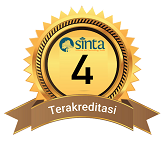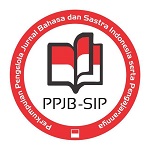Penggunaan Moodle untuk Keterampilan Menulis Teks Eksposisi dalam Inovasi Pembelajaran Bahasa
Abstract
Telah banyak dilakukan penelitian mengenai Moodle, LMS terkenal, dan pengaruhnya terhadap berbagai aspek pendidikan. Akan tetapi, terdapat kekurangan yang signifikan dalam literatur mengenai penggunaan Moodle secara spesifik untuk meningkatkan kemampuan menulis teks eksposisi. Penelitian ini untuk mengetahui bagaimana pemahaman dan kemampuan siswa menulis teks eksposisi dan bagaimana penggunaan Moodle dalam meningkatkan kemampuan menulis teks eksposis. Melalui metode penelitian literatur review, penulis memilih 2 artikel dari 19 artikel terkait Moodle dan memilih 6 artikel dari 18 artikel terkait penulisan teks eksposisi untuk dianalisa. Dari hasil penelitian ini, siswa mampu menulis teks eksposisi dengan baik dengan pemahaman yang baik juga. Di samping itu, penggunaan Moodle dapat meningkatkan kemampuan menulis siswa bahasa Inggris. Penggunaa Moodle lebih efektif daripada metode konvensional dalam meningkatkan kemampuan menulis siswa, dengan hasil yang menguntungkan kelompok eksperimen. Implikasinya adalah peneliti lain bisa meneliti dampak penggunaan Moodle untuk meningkatkan kemampuan teks eksposisi di sekolah dasar.
Keywords
Full Text:
PDF (Bahasa Indonesia)References
Agustina, I., Nasrudin, N., Putra, S., Akrim, A., & Maharani, D. (2020). The Effect of Moodle Implementation in English for Multimedia Classroom on Students’ Achievement in Reading and Writing. Proceedings of the Proceedings of the Third Workshop on Multidisciplinary and Its Applications, WMA-3 2019, 11-14 December 2019, Medan, Indonesia. https://doi.org/10.4108/eai.11-12-2019.2290814
Agustina, R., Maesaroh, P., & Mustika, I. (2019). Manifestation of writing exposition text to provide conceptual factual information in class X students in Pasundan informatics private vocational school. JLER (Journal of Language Education Research), 2(2), 28–35. https://doi.org/10.22460/jler.v2i2.p28-35
Ayan, E. (2015). Moodle as Builder of Motivation and Autonomy in English Courses. Open Journal of Modern Linguistics, 05(01), 6–20. https://doi.org/10.4236/ojml.2015.51002
Bouziane, A., & Zyad, H. (2018). The Impact of Self and Peer Assessment on L2 Writing: The Case of Moodle Workshops. In Assessing EFL Writing in the 21st Century Arab World (pp. 111–135). Springer International Publishing. https://doi.org/10.1007/978-3-319-64104-1_5
Charlina, C., Septyanti, E., Mustika, T. P., & Rahmi, A. (2022). Electronic module as learning needs to write exposition texts for junior high school students. Journal of Education and Learning (EduLearn), 16(2), 219–225. https://doi.org/10.11591/edulearn.v16i2.20402
Emilia, E., Habibi, N., & Bangga, L. A. (2018). An analysis of cohesion of exposition texts: an indonesian context. Indonesian Journal of Applied Linguistics, 7(3), 515. https://doi.org/10.17509/ijal.v7i3.9791
Fatahillah, M., Nazar, M., & Nisrina, N. (2023). An Investigation into Reading Strategies Employed by Students for Comprehending Exposition Texts. JETLEE : Journal of English Language Teaching, Linguistics, and Literature, 3(2), 61–67. https://doi.org/10.47766/jetlee.v3i2.1222
Fernando, W. (2020). Moodle quizzes and their usability for formative assessment of academic writing. Assessing Writing, 46, 100485. https://doi.org/10.1016/j.asw.2020.100485
Gamage, S. H. P. W., Ayres, J. R., & Behrend, M. B. (2022). A systematic review on trends in using Moodle for teaching and learning. International Journal of STEM Education, 9(1), 9. https://doi.org/10.1186/s40594-021-00323-x
Garner, R. (1987). Strategies for Reading and Studying Expository Text. Educational Psychologist, 22(3–4), 299–312. https://doi.org/10.1080/00461520.1987.9653054
Gay, M., Halil, M., Susanti, P., Ahmad, I., & Ismail, J. (2022). Characteristics of Revising High School Students’ Exposition Text In Schematic Perspective. Proceedings of the 6th Batusangkar International Conference, BIC 2021, 11 - 12 October, 2021, Batusangkar-West Sumatra, Indonesia. https://doi.org/10.4108/eai.11-10-2021.2319563
Ginting, H., Gafari, M. O., & Lubis, M. (2019). Development of Exposition Text Writing Teaching Materials With Genre Approach to Students of Grade X Vocational High School Brigjen Katamso Medan. Budapest International Research and Critics in Linguistics and Education (BirLE) Journal, 2(3), 372–397. https://doi.org/10.33258/birle.v2i3.377
Herman, P. A., Anderson, R. C., Pearson, P. D., & Nagy, W. E. (1987). Incidental Acquisition of Word Meaning from Expositions with Varied Text Features. Reading Research Quarterly, 22(3), 263. https://doi.org/10.2307/747968
Islami, R., Ramadhan, S., & Asri, Y. (2018). Development of Writing Exposition Text Materials Based-PBL. Proceedings of the International Conference on Language, Literature, and Education (ICLLE 2018). https://doi.org/10.2991/iclle-18.2018.22
Kemala, A., Sastromiharjo, A., & Mulyati, Y. (2020). Students’ Problems in Writing Exposition Texts: Structure, Function, and Effectiveness. Proceedings of the Twelfth Conference on Applied Linguistics (CONAPLIN 2019). https://doi.org/10.2991/assehr.k.200406.003
Kiptiyah, B. M. (2019). Critical and creative thinking in the writing of the exposition text. ISLLAC : Journal of Intensive Studies on Language, Literature, Art, and Culture, 3(1), 19–25. https://doi.org/10.17977/um006v3i12019p019
Kurniawan, B. I., & Septiana, A. R. (2021). An Analysis of Students’ Experience in the Use of Moodle in Writing Class during Pandemic Covid-19. Linguists : Journal Of Linguistics and Language Teaching, 7(2), 16. https://doi.org/10.29300/ling.v7i2.5318
Lien, H.-Y. (2015). Cooperative Writing Peer Feedback in Online Moodle System. In Communications in Computer and Information Science (pp. 283–289). Springer, Cham. https://doi.org/10.1007/978-3-319-21383-5_48
Linawati, Dewi Wirastuti, N., Sukadarmika, G., Arsa Suyadnya, I. M., & Krishne, D. C. (2016). Adaptive online learning design using moodle. 2016 International Conference on Smart Green Technology in Electrical and Information Systems (ICSGTEIS), 98–101. https://doi.org/10.1109/ICSGTEIS.2016.7885773
Mujiono, & Fatimah, S. (2022). Moodle Integration Intervention in EFL Virtual Classroom and Academic Flow on University Students’ Achievement in Writing. Theory and Practice in Language Studies, 12(10), 2182–2190. https://doi.org/10.17507/tpls.1210.26
Muslimin, M. (2019). The Students’ Ability in Writing English Exposition Texts: Descriptive Study at the Second Grade of Senior High School of Hangtuah 3 Mataram in Academic Year 2016-2017. Linguistics and Elt Journal, 5(1), 56. https://doi.org/10.31764/leltj.v9i1.737
Nagi, K. (2008). Use of moodle reports for knowledge management, planning and eTraining in SMEs. 2008 4th IEEE International Conference on Management of Innovation and Technology, 946–950. https://doi.org/10.1109/ICMIT.2008.4654494
Piotrovskaya, L. A., & Trushchelev, P. N. (2021). The effect of expository text structure on text-based interest: Problem-based exposition (the linguistic aspect). Vestnik of Saint Petersburg University. Language and Literature, 18(4), 792–809. https://doi.org/10.21638/spbu09.2021.410
Priatno, B., Padaameen, S., & Siregar, S. H. (2022). Penyediaan Teks Eksposisi Berbasis Profetik sebagai Bahan Ajar Pengayaan bagi Guru SMA/SMK/MA. Jurnal Pembelajaran Bahasa Dan Sastra, 1(4), 553–560. https://doi.org/10.55909/jpbs.v1i4.122
Rambe, R. H., Gafari, M. O. F., & Solin, M. (2019). The Development of Contextual Text Based Exposition Writing Teaching Materials of Class X Students in State 16 Senior High School, Medan. Budapest International Research and Critics in Linguistics and Education (BirLE) Journal, 2(2), 156–166. https://doi.org/10.33258/birle.v2i2.287
Rosmiana, S., Samad, I. S., & Mustakim, M. (2020). The Use of Moodle in Enhancing Students’ Motivation. Edumaspul: Jurnal Pendidikan, 4(2), 155–158. https://doi.org/10.33487/edumaspul.v4i2.647
Sari, A., Baedhowi, P., & Indrawati, D. (2017). The Use of Learning Media with Moodle Approach to Improve the Quality of Education: A Literature Study. Proceedings of the International Conference on Teacher Training and Education 2017 (ICTTE 2017). https://doi.org/10.2991/ictte-17.2017.33
Simanjuntak, M. P., Marpaung, N., Sinaga, L., & Siagian, E. (2022). The use of moodle as a learning management system to improve student learning outcomes. 140004. https://doi.org/10.1063/5.0114301
Wijayanti, K. K., & Permana, S. (2020). Students’ Performance in Writing English Exposition Text of the Eleventh Graders of SMAN 13 Jakarta. Stairs, 1(1), 35–42. https://doi.org/10.21009/stairs.1.1.5
Williyan, A., Sutopo, D., & Widhiyanto, W. (2019). The Implementation of Thematic Development in Exposition Texts by EFL Learners. English Education Journal, 9(2), 276–283. https://doi.org/10.15294/eej.v9i2.30585
Wischgoll, A. (2017). Improving Undergraduates’ and Postgraduates’ Academic Writing Skills with Strategy Training and Feedback. Frontiers in Education, 2. https://doi.org/10.3389/feduc.2017.00033
Wulandari, M. (2015). Moodle-Based Learning Model for Paragraph Writing Class. Language and Language Teaching Journal, 18(02), 73–90. https://doi.org/10.24071/llt.2015.180201
DOI: https://doi.org/10.21107/metalingua.v9i2.25324
Refbacks
- There are currently no refbacks.
Copyright (c) 2024 Yeny Rahma, Ida Zulaeha, Panca Dewi Purwati

This work is licensed under a Creative Commons Attribution-ShareAlike 4.0 International License.
Jurnal Pendidikan Bahasa dan Sastra Indonesia Metalingua by Universitas Trunojoyo Madura is licensed under a Creative Commons Attribution-ShareAlike 4.0 International License.















